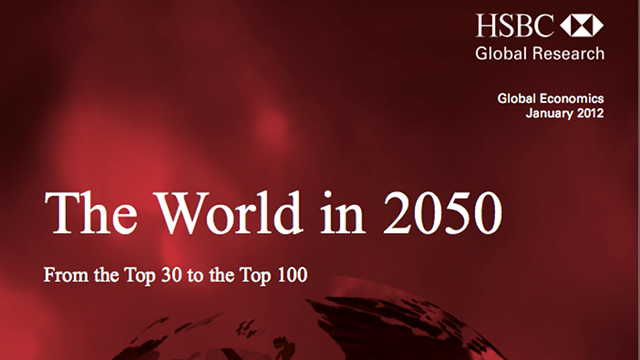SUMMARY
This is AI generated summarization, which may have errors. For context, always refer to the full article.

MANILA, Philippines – If the Philippines will keep improving its education system and strengthening its democracy, Filipinos can earn roughly P40,120 a month by 2050 as the country becomes the world’s 16th largest economy, HSBC Global Research predicts.
In its January 2012 report titled “The World in 2050,” HSBC Global Research pegs the Philippines’ income per capita at $10,893 or P481,470 a year based on constant US dollar exchange terms in 2000.
Based on a peso-dollar exchange rate of P44.2 in 2000, this translates to roughly P40,122.55 a month – a far cry from the income per capita of around P4,475 monthly in 2010, according to HSBC.
The income per capita is the country’s gross national product, or output of final goods and services, divided by its total population.
HSBC says that by 2050, the Philippines will see its economy grow to $1.688 trillion – even bigger than the French economy in 2010, which was at $1.496 trillion.
Meanwhile, the population in 2050 will likely boom to 155 million from 93 million in 2010, says HSBC.
What will make it happen?
HSBC considers the Philippines a “star performer” where “the combination of strong fundamentals and powerful demographics gives rise to an average growth rate of 7% for the coming 40 years.”
“We are clearly assuming governments continue to improve the underlying economic infrastructure, implementing reform, increasing education, and so forth, and remain friendly with their neighbors,” HSBC says.
The research firm gives particular importance to education and democracy, which it says can make individuals more productive and eventually help improve the economy.
HSBC says education, like health and fertility, helps in driving “human capital.” Meanwhile, factors like rule of law, government interference, democracy, and monetary control “determine the likelihood of fixed capital investment to equip workers with tools and technology.”
The research firm, however, notes that its model “will not capture all the variables that dictate an economy’s potential.” “There may be idiosyncratic factors that mean a country should feature more highly or, indeed, lower down our economic league table,” the think-tank adds. – Rappler.com
Add a comment
How does this make you feel?
There are no comments yet. Add your comment to start the conversation.